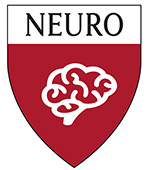Rio McLellan (Neuroscience with secondary in Philosophy ‘23) has been awarded the Dowling Prize for undergraduate thesis research in neurobiology. Named for MCB faculty John Dowling, the prize recognizes undergraduates who go above and beyond in their thesis research.
McLellan’s thesis, which she conducted in Lee Rubin’s lab in the department of Stem Cells and Regenerative Biology (SCRB) focused on heat shock proteins that live in blood vessels in the brain. Heat shock proteins are tasked with refolding misfolded proteins and breaking down clumps of protein aggregates. Protein aggregation in the brain vasculature is a hallmark of several neurodegenerative diseases, including Alzheimer’s disease, Parkinson’s disease, and ALS and is known to be harmful to brain endothelial cells, the cells that line the brain vasculature. However, McLellan’s results indicated that raising the levels of heat shock proteins in these cells could have a protective effect. “To promote the survival of brain endothelial cells in the face of toxic protein aggregation, I investigated the potential of heat shock proteins to protect these cells by facilitating the refolding and degradation of protein aggregates,” McLellan explains. “Ultimately, I hope my thesis sheds light on how the brain vasculature plays a crucial, yet understudied, role in brain health and disease.”
MCB faculty John Dowling praised the thesis, saying, “Rio has written a marvelous thesis. Beautifully and clearly written, it describes critical experiments that suggest changes in brain vascular cells play a role in the aggregation of proteins in neurodegenerative diseases, thus suggesting a potential therapeutic target for Alzheimer’s and similar diseases.”
Research on neurodegeneration has been part of McLellan’s Harvard experience since her first year and is something she plans to continue during her graduate work at The Rockefeller University in New York. “When I first arrived at Harvard, I immediately jumped into working on a research project with a visiting fellow, Chiara Zurzolo from Institut Pasteur, working on a project studying a novel form of intercellular connection thought to be involved in neurodegenerative diseases,” McLellan says. “I ended up following my fellow to France for the summer and that’s truly where I fell in love with research on neurodegeneration. To me, it was such an interesting problem with a lot of open questions that I couldn’t wait to dive into.”
“Rio joined the Rubin Lab during her sophomore year to explore a possible career in research as an alternative to medicine and was immediately hooked. Now she is one of our most committed student researchers,” says Neuroscience Concentration Advisor Laura Magnotti. “I had the pleasure of reading Rio’s thesis (all 97 pages of it!) and honestly cannot think of enough compliments to demonstrate how impressed I was with both her scientific achievements and her communication skills. She truly worked at the level of a graduate student and produced a publication-quality document that was both compelling and engaging. Rockefeller will be lucky to have her as a PhD student next year.”
McLellan cites Lee Rubin’s course “The Translational Science of Stem Cells” as one that influenced her thesis work. “The course delves into the various applications of stem cells, from modeling diseases to developing therapies,” she says. “It was an amazing experience to take this class while simultaneously working on my thesis, as I had just learned how to culture stem cells and was utilizing iPSC-derived brain endothelial cells to simulate neurodegenerative phenotypes.”
She adds that receiving the Dowling Prize for work on blood vessels came as a surprise. “I was absolutely shocked when they announced that I had won,” McLellan says. “I think I was mid-bite at the neuro thesis awards dinner when they announced my name because I never thought in a million years it would be me. My thesis isn’t traditionally what one might expect for a “neuro” thesis given it focuses on blood vessels and not neurons. So I was really worried the whole time when I was working on it that the department might not even accept my thesis. Receiving this prize has even made all of the experiments that didn’t work feel so worthwhile. I feel so grateful for all those who helped me to make this project happen – particularly for my mentor Dr. Rich Giadone, my PI Dr. Lee Rubin, and all the members of the Rubin Lab. Thank you all for putting up with me through the laughs and the tears. This prize belongs to all of you, too.”



